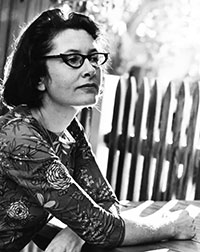 *
*
Mark Pawlak, a former Somerville resident, had an informal apprenticeship with the late poet Denise Levertov (1923 to 1997). Levertov, a noted lyrical and political poet held court at her home at Glover Circle, right outside Davis Square.

Late poet Denise Levertov
While teaching at Tufts and MIT, she sort of had an ongoing poetry salon at her house where poets like Mark Pawlak learned their craft back in the 60s and 70s. Pawlak has a new book about his experiences with Levertov entitled My Deniversity: Knowing Denise Levertov. I had the chance to speak with Pawlak on my Somerville Media TV show, Poet to Poet: Writer to Writer.
Pawlak, an accomplished writer and poet in his own right, and a founder of the noted Hanging Loose Press, told me that he thought Levertov had three distinct phases in her life. The first was when she immigrated from London, and married Mitch Goldman, a writer and political activist from Brooklyn. Then she transitioned to become an “American.” Pawlak recalled that she wrestled with the American idiom. She eventually became comfortable with it.
Levertov’s early poems were very sensual. The noted poet William Carlos Williams compared her to Sappho. Later, she transitioned to becoming a more political poet. With the advent of the Vietnam War, she and her husband became devoted anti-war activists. So, the political gradually seeped into her poetry. Pawlak said, “She never stopped being political.” Pawlak continued, “Some poets said her poetry suffered because of this new trend, they felt her poems were too didactic.”
Pawlak, who still teaches physics at U/Mass Boston, was a physics student at MIT when he heard about Levertov from his roommate. Pawlak was very interested in poetry, and he was particularly fascinated with Walt Whitman. He read most of the body of his work when he was younger. So he attended Levertov’s workshop at MIT, and that was the beginning of a long association with her.
Levertov had a home about a block outside Davis Square on Grover Circle. This was a short walk for Pawlak. Levertov let him drop in whenever he wanted. He recorded the many conversations he had with her in his notebooks, some of which are included in Deniversity. Pawlak told me Grover Circle was a sort of an ongoing literary salon. People would come in and out and discuss poetics, politics – a whole range of things.
We are all to some degree walking contradictions. And Pawlak told me that Levertov, despite being very political, never felt being a woman had anything to do with the quality of her work. Many younger women wanted her to be a mentor, a feminist who stands up to the patriarchy of the male-dominated literary world, but she wouldn’t have it.
Eventually, Pawlak and Levertov parted ways. Pawlak reflected, “Often, mentors want to be a continuing influence on their proteges. When I started to meet poets of my own generation, and others she didn’t approve of, we drifted apart. She became extremely critical of my poetry, so we moved on.”
In the end Pawlak was very lucky to have a mentor like Levertov. Perhaps without her he would never fully explored the craft, and become the accomplished man of letters he is today.















Reader Comments